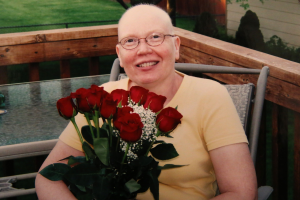WESTFIELD – Even at a young age, Deane (Martel) Berg knew that her vocation would be in health care one day. Her background as a health care provider would serve her well when she was diagnosed with stage 3 ovarian cancer in 2007.
Berg, a Westfield native who grew up on Oak Terrace in the 1960’s, was recently featured in the New York Post for sharing her story of being diagnosed with ovarian cancer which she attributed to her use of Johnson & Johnson’s Baby Powder and Shower to Shower products as a daily routine since she was 18. She is now 58 and has two daughters, ages 30 and 27.
“I didn’t smoke, I wasn’t overweight, and I did not have a family history of ovarian cancer,” said Berg, a physician’s assistant at a veteran’s center in Sioux Falls, S.D. “The one risk factor at that time was my use of talcum powder.”
During the past week in a Missouri courtroom, the family of an Alabama woman who died from ovarian cancer which was linked to her lifelong use of Johnson & Johnson’s talc-based Baby Powder and Shower to Shower products was awarded $72 million.
Berg said she was “relieved” that the issue by Johnson & Johnson to conceal the dangers of the talc products was finally brought to light.
In 2013, Berg had also sued Johnson & Johnson, and a federal jury had found that its body powder products were a factor in her condition. Berg and her family have made their home in Sioux Falls since 1980.
“South Dakota is a very conservative state,” she said, “and there had to be a unanimous verdict on whether any compensation should be paid.”
The jury was not unanimous in a verdict so Berg did not receive a settlement.
Johnson & Johnson had released a statement to the New York Post that stated: “We have no higher responsibility than the health and safety of consumers who use our products and we sympathize with Ms. Berg. At the same time, we are pleased that the jury unanimously rejected the claim that talc is defective as labeled and declined to award any damages. It is important for consumers to know that the safety of cosmetic talc is supported by decades of scientific evidence and independent peer-reviewed studies.”
“I didn’t do it for the money,” said Berg, adding she had rejected a $1.3 million out-of-court settlement because she did not want to sign a confidentiality clause. “When I was ill, I wanted to know what was causing this cancer. I found information to back it up and I wanted to get the word out to the public if there was a risk.”
That “information” came from a leaflet she received from her oncologist in 2007 from Gilda’s Club, a foundation established by friends of the late actress Gilda Radner.
“To my astonishment, it said that use of talcum powder has been implicated in the development of ovarian cancer,” she said.
As a health care provider, Berg felt something was wrong when spotting was noted between her periods. A family practitioner said “you’re fine,” to Berg in the fall of 2006. She then decided to go to a gynecologist for a second opinion. An ultrasound was done that found a hemorrhagic ovary. When the ovaries were removed, bilateral cancer was found.
“My heart sank when the doctor told me the diagnosis,” said Berg.
She then had a total hysterectomy and ports were placed for chemotherapy.
“You are told that your hair will fall out and you will have no appetite, but it was much worse than that,” said Berg. “I began having severe abdominal pain, vomiting, diarrhea, hearing loss and severe headaches soon after the first dosage of chemotherapy as it was put into catherers in both my chest and abdomen. As a health care provider I never realized how difficult chemotherapy was to go through.”
Berg said that despite a lot of people staring at her in public after she lost her hair, she found a glimmer of hope one day from a stranger.
“A woman came up to me, tapped me on the shoulder and said, ‘Do you have cancer?’ I said, ‘Yes.’ The woman then wrapped her arms around me and said, ‘I know what you are going through as I had it too and made it through the chemo. Don’t give up.’”
Berg said that moment touched her heart and helped give her the hope that she could make it through the chemotherapy.
“I also got wonderful support from my family and friends at work and this too helped give me courage and stamina,” said Berg.
Berg especially found comfort from her parents, George Martel, who at 93 still lives in Westfield, and her mother, Patricia (Hill) Martel. Patricia Martel passed away in 2011.
“During her ordeal with cancer it was very difficult for me being so far away and retired here in Westfield,” said Martel. “We constantly stayed in touch via telephone and letters offering her our support during her recovery and praying that she would get better knowing how deadly this disease can be.”
About a year later, in 2008, Berg was told her cancer went into remission.
Now when Berg visits her physicians for routine check-ups, most often they comment, “You are one lucky woman,” she said.
“My prognosis is very good,” said Berg, noting she relishes her full-time job as a physician’s assistant. “This experience has shaped how I interact with my patients every day.”
For Berg, as she continues to “astound” her team of physicians, she said she couldn’t be happier and is hopeful for the future.
“I believe that talc can cause ovarian cancer in women,” she said. “In my opinion, talcum powder products should be withdrawn from the market and, until then, be clearly labeled indicating the risk.”
While the thought of cancer returning never leaves her mind, Berg said she will continue to speak out about the dangers of talc.
“My lawyers have said I am the equivalent of the first smokers who sued tobacco companies because of their lung cancer,” she said. “The pioneers didn’t receive compensation, but the dangers and the conspiracy were finally exposed.”



